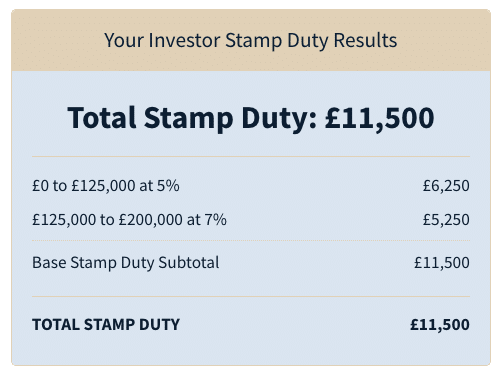Buy-to-Let Costs: What it Really Costs to Buy a House and Rent it Out in the UK
The average costs to buy a house in the UK for investment purposes typically range from upfront buying costs of 6.5-8% of the property value, plus ongoing property management costs of 22-30% of your rental income.
However, when it comes to reducing costs and actually making money in property, there are many variables, including your location (a buy-to-let in Telford in the Midlands will likely cost less to buy and manage than a buy-to-let in Ely in the South) and your property strategy (a family vanilla buy-to-let will cost less to manage than a Student HMO).
Today's article walks you through the whole buying and holding journey of being a landlord, helping you budget wisely and build sustainable success.
Article updated: June 2025
Complete UK Property Investment Cost Breakdown
When considering the costs to buy a house in the UK for investment and the ongoing costs involved in renting out a property, here's what a typical £200,000 investment property generating £1,600 monthly rent (8% yield) will cost you:
- Stamp duty (England): £11,500 for £200k property (5.75% of purchase price)
- Legal fees: £650 - £1,500 conveyancing, plus £200-£400 searches
- Survey costs: £300-£400 basic valuation, £400-£800 homebuyer, £600-£1,200 structural
- Mortgage costs: £500-£2,000 arrangement fees, plus £50,000+ deposit (25%)
- Total upfront costs: £62,850 - £67,500 (including deposit and all fees)
- Buildings insurance: £220 - £300 annually
- Letting agent fees: £2,304 - £3,456 annually (10-15% + VAT of rental income)
- Maintenance budget: £1,600 annually (1 month's rent guideline)
- Safety certificates: £200 - £400 (gas, electrical, EPC)
Contents
Part 1 - Buying Costs
Part 2 - Buy-to-Let Managing Costs
Part 3 - Easily Improve Portfolio

-
by Robert Jones, Founder of Property Investments UK
With two decades in UK property, Rob has been investing in buy-to-let since 2005, and uses property data to develop tools for property market analysis.
Part 1: Buying Costs - Getting Your Investment Started
Starting your property investment journey means facing some substantial upfront costs. These one-time expenses typically add 6.5-8% to your purchase price, but having a property investment checklist and knowing what's coming helps you plan effectively and avoid nasty surprises when you're ready to complete.
Stamp Duty for Investment Properties
Successive Government stamp duty increases make it clear they are hitting property investors harder than regular homebuyers, and it's usually your largest upfront cost after the deposit.
Since April 2016, investment properties have faced an additional 3% surcharge on top of standard rates, which can feel like a significant burden when you're starting out.
The mathematics are straightforward but expensive, and we have created a calculator to help you work out your stamp duty costs for each UK country, including options for homeowners, landlords and overseas investors.
As an example:
For an investor buying a £200,000 investment property in Salisbury (England), you'll pay approximately £11,500 in stamp duty.

Step up to a £300,000 property, and that figure jumps to around £20,000. For more expensive properties, the % of stamp duty increases at various brackets depending on what country you are purchasing in, making your location (and stamp duty) a critical factor in your property selection.
This is one reason why some investors focus on lower-value properties like purpose-built student properties (PBSA) and low-value locations to minimise these costs.
Legal Fees and Conveyancing
Every property purchase requires legal work to transfer ownership and ensure you're getting a clear title.
Whilst some investors may choose to do their own DIY conveyancing, the risk of getting it wrong can be high, yet the cost of solicitors is relatively affordable considering all the other house buying costs you will have to cover.
Most straightforward buy-to-let purchases cost between £650 and £1,500 for conveyancing, though leasehold properties often push towards the higher end due to additional complexity. Your solicitor needs to examine lease terms, ground rent obligations, and service charge arrangements, which naturally takes more time and expertise.
Location plays a role in legal costs too. London solicitors and properties generally command higher fees, simply because the cost of the property is higher and some solicitors charge a % fee, and also because the cost of most products and services in London cost more than elsewhere as the cost of living and salaries are higher and conveyancing is no different.
Budget for:
- Standard conveyancing: £650 - £1,500
- Leasehold additional work: £300 - £500 extra
- Property searches: £200 - £400
International buyers often benefit from solicitors experienced with overseas clients, though this specialisation might increase costs slightly. Most established property investment conveyancers handle overseas buyers regularly without significant fee increases.
Surveys and Property Valuations
Professional home surveys protect your investment by identifying potential problems before you commit to purchase. While your mortgage lender requires a basic valuation, smart investors often choose more comprehensive surveys for better protection.
The basic mortgage valuation costs £300-400 and satisfies lender requirements, but it focuses on security for the mortgage rather than giving you detailed property condition information. Think of it as the minimum viable survey rather than comprehensive protection.
RICS Home survey level 2 and 3 homebuyer reports cost £400-800 and provide much more useful information for investors. These reports highlight major defects and potential repair costs, giving you ammunition for price negotiations or the confidence to walk away if problems seem too expensive.
For older properties or sellers selling houses with structural problems, full structural surveys cost £600-1,200 but deliver a comprehensive analysis including detailed repair recommendations. A £600 survey that identifies £50,000 of hidden structural problems represents excellent value by preventing a costly mistake.
We have created a full breakdown of home survey costs for England, Scotland and Wales here.
Mortgage and Broker Fees
Buy-to-let mortgages require significantly larger deposits than residential purchases. While you might secure a residential mortgage with 5% down, investment properties typically demand at least 25%+ deposits. Even if you are buying one of the cheapest houses in the UK this is significant, and for the UK's average property price of £280,000, that means finding £70,000+ upfront.
Arrangement fees typically range from £500 to £2,000, though some lenders charge 1-2% of the mortgage amount instead. You can usually add these to your mortgage rather than paying upfront, but this increases your overall borrowing costs over the mortgage term.
Example mortgage costs:
- Minimum deposit: 25%+ of property value
- Arrangement fees: £500-£2,000 (or 1-2% of loan)
- Early repayment charges: 1-5% of outstanding balance if you exit and pay of your mortgage early
Our LTV calculator helps you understand how much you can borrow against different property values, while our rental yield calculator shows whether rental income meets lender requirements.
Part 2: Buy-to-Let Managing Costs
Buying a cheap home in Wales or England is only part of the process to reducing the outgoings for your rental investment.
Once you complete your purchase, a new set of ongoing costs begins. These expenses continue throughout your ownership and ultimately determine whether your investment generates the returns you're hoping for.
The good news is that most of these costs are predictable and manageable with proper planning. The challenge lies in balancing cost control with maintaining property condition and tenant satisfaction.
Buy-to-Let Insurance Costs
Landlord insurance differs fundamentally from standard home insurance, covering the unique risks of rental properties. Standard home insurance policies typically become invalid the moment you rent your property to tenants, making specialist cover essential rather than optional.
Building insurance forms the foundation, typically costing £1.10 to £1.50 per year for every £1,000 of property value insured. For a £200,000 property, expect annual premiums of £220-300 for basic building cover, though this varies significantly by location and construction type.
Contents insurance becomes relevant for furnished properties, adding £50-150 annually to cover appliances, furniture, and fixtures you provide for tenants. This coverage proves essential if you're offering fully furnished accommodation, although most buy-to-let tenancies and properties are provided unfurnished.
Insurance costs:
- Buildings insurance: £1.10-£1.50 per £1,000 of value annually
- Contents insurance: £50-£150 annually for furnished properties
- Rent guarantee insurance: 1% of annual rental income
- Legal expenses cover: £50-£150 annually
Rent guarantee insurance protects against tenant default, typically costing approximately 1% of annual rental income. For a property generating £12,000 annual rent, expect premiums of £120 annually. This coverage provides valuable peace of mind, particularly for new landlords.
For portfolio landlords, you can often get a discount on your insurance if you own two or more buy to let properties.
Letting Agent Fees and Management
Professional letting agents handle the day-to-day running of your rental property, from finding tenants to collecting rent and coordinating repairs. Their fees vary significantly based on service level and local market conditions.
Full management services typically cost 10-15% of rental income plus VAT. This includes tenant finding, rent collection, property inspections, maintenance coordination, and handling tenant communications. For busy investors or those with properties far from home, this comprehensive service is well worth it. All our properties are now fully managed by letting agents (even one's local to us) and the peace of mind and time saving is immensely worthwhile.
Tenant-finding-only services cost less but leave you handling ongoing management. Expect to pay 50-100% of the first month's rent for tenant finding only which includes sourcing, referencing, and tenancy setup.
Experience matters enormously with letting agents. Managing a family home requires different skills from managing an HMO filled with young professionals. The relationship your agent maintains with tenants directly affects their satisfaction levels and, ultimately, your bottom line. Do not be tempted to simply go with the cheapest option for this service. Instead, spend the time to research and go with the best letting agent for you, your property location and your tenant type.
Property Maintenance and Repairs
Regular maintenance protects your asset value while keeping tenants happy and keen to stay longer. Often UK landlords spend an average of one month's rent annually on maintenance, yet some advise saving around 1% of the property value a year to have as a maintenance fund.
For a £200,000 property renting at £16,000 per annum (8% rental yield) that works out at either £1,333 to £2,0000 per year maintenance budget depending on what advice you follow.
Licensing and Compliance Costs
Buy-to-Let landlords are now required to license their property in many local authorities across England and Wales. Although each council takes their own approach to this and not all have selective licensing in place. Where it is a requirement costs really vary from £500 to £1,500 for what is often a 5 year licence.
To get an accurate cost, your local council website will have an updated process and fee structure for licensing your property like this one for landlords buying properties in Oldham, by Oldham council.

Essential Safety and Legal Compliance
Property safety compliance requires annual certificates and ongoing monitoring that many new landlords underestimate. These aren't optional expenses; they're legal requirements that protect both your tenants and your investment.
Gas safety certificates may cost £80+ annually and must be completed by Gas Safe registered engineers. Every gas appliance, flue, and fitting requires annual inspection.
Energy Performance Certificates cost £60-£80 and must be renewed every 10 years. You'll also need a new EPC for each new tenancy, making this an ongoing rather than one-time expense.
EICR electrical reports are required every 5 years and costs vary depending on the size of the property, with one bedroom apartments to 3 bedroom houses, EICRs likely costing between £175 - £350.
HMO-Specific Running Costs
Houses in Multiple Occupation carry additional ongoing costs that reflect their more intensive management requirements and higher utility usage. Understanding these extra expenses helps you evaluate whether HMO investments suit your budget and management style.
We have created a free House of Multiple Occupation cost calculator here that helps you assess the true costs for purchasing and running a HMO in your portfolio.

